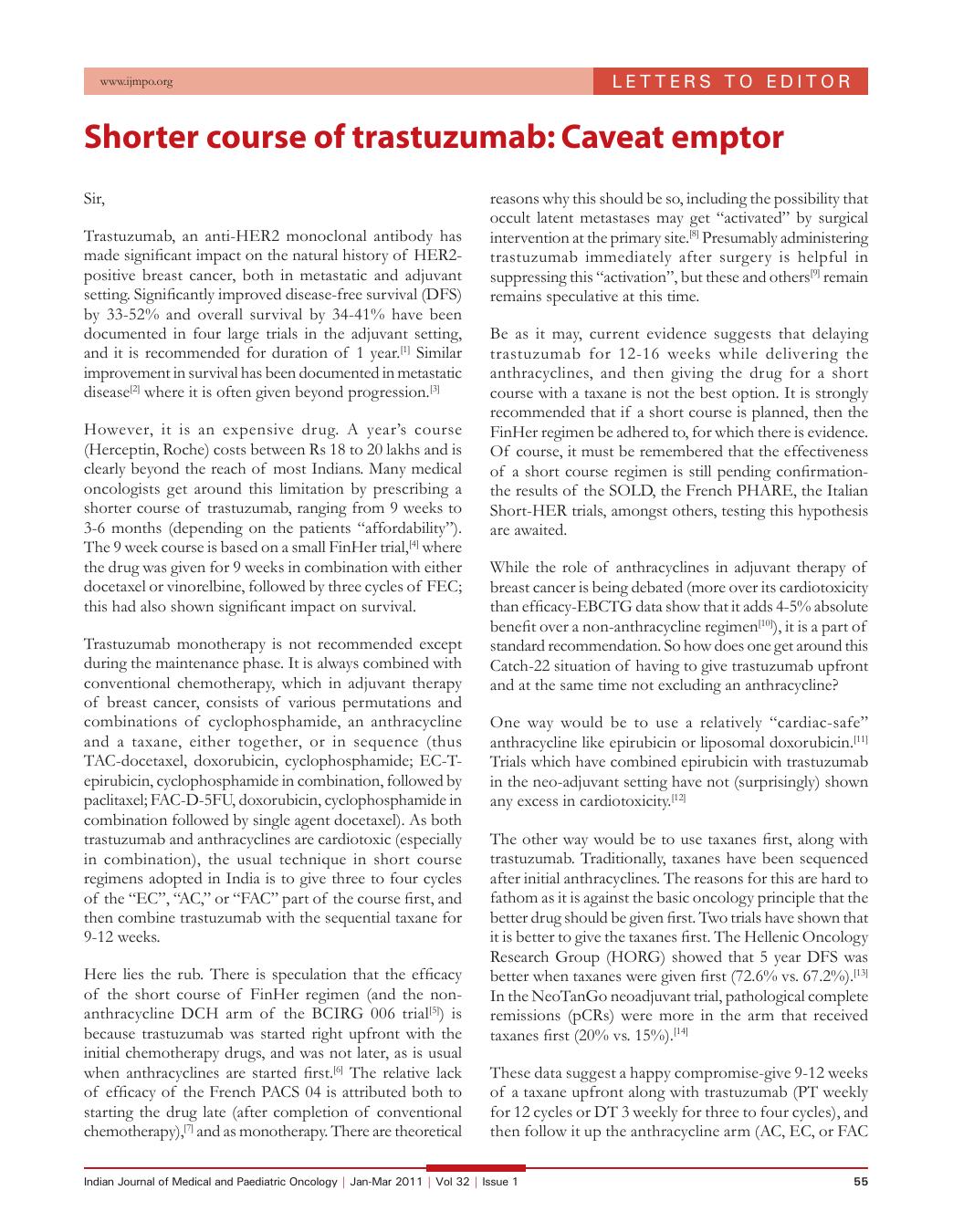Shorter course of trastuzumab: Caveat emptor
CC BY-NC-ND 4.0 · Indian J Med Paediatr Oncol 2011; 32(01): 55-56
DOI: DOI: 10.4103/0971-5851.81893

Publication History
Article published online:
16 August 2021
© 2011. Indian Society of Medical and Paediatric Oncology. This is an open access article published by Thieme under the terms of the Creative Commons Attribution-NonDerivative-NonCommercial-License, permitting copying and reproduction so long as the original work is given appropriate credit. Contents may not be used for commercial purposes, or adapted, remixed, transformed or built upon. (https://creativecommons.org/licenses/by-nc-nd/4.0/.)
Thieme Medical and Scientific Publishers Pvt. Ltd.
A-12, 2nd Floor, Sector 2, Noida-201301 UP, India
Sir,
Trastuzumab, an anti-HER2 monoclonal antibody has made significant impact on the natural history of HER2-positive breast cancer, both in metastatic and adjuvant setting. Significantly improved disease-free survival (DFS) by 33-52% and overall survival by 34-41% have been documented in four large trials in the adjuvant setting, and it is recommended for duration of 1 year.[1] Similar improvement in survival has been documented in metastatic disease[2] where it is often given beyond progression.[3]
However, it is an expensive drug. A year's course (Herceptin, Roche) costs between Rs 18 to 20 lakhs and is clearly beyond the reach of most Indians. Many medical oncologists get around this limitation by prescribing a shorter course of trastuzumab, ranging from 9 weeks to 3-6 months (depending on the patients “affordability”). The 9 week course is based on a small FinHer trial,[4] where the drug was given for 9 weeks in combination with either docetaxel or vinorelbine, followed by three cycles of FEC; this had also shown significant impact on survival.
Trastuzumab monotherapy is not recommended except during the maintenance phase. It is always combined with conventional chemotherapy, which in adjuvant therapy of breast cancer, consists of various permutations and combinations of cyclophosphamide, an anthracycline and a taxane, either together, or in sequence (thus TAC-docetaxel, doxorubicin, cyclophosphamide; EC-T-epirubicin, cyclophosphamide in combination, followed by paclitaxel; FAC-D-5FU, doxorubicin, cyclophosphamide in combination followed by single agent docetaxel). As both trastuzumab and anthracyclines are cardiotoxic (especially in combination), the usual technique in short course regimens adopted in India is to give three to four cycles of the “EC”, “AC,” or “FAC” part of the course first, and then combine trastuzumab with the sequential taxane for 9-12 weeks.
Here lies the rub. There is speculation that the efficacy of the short course of FinHer regimen (and the non-anthracycline DCH arm of the BCIRG 006 trial[5]) is because trastuzumab was started right upfront with the initial chemotherapy drugs, and was not later, as is usual when anthracyclines are started first.[6] The relative lack of efficacy of the French PACS 04 is attributed both to starting the drug late (after completion of conventional chemotherapy),[7] and as monotherapy. There are theoretical reasons why this should be so, including the possibility that occult latent metastases may get “activated” by surgical intervention at the primary site.[8] Presumably administering trastuzumab immediately after surgery is helpful in suppressing this “activation”, but these and others[9] remain remains speculative at this time.
Be as it may, current evidence suggests that delaying trastuzumab for 12-16 weeks while delivering the anthracyclines, and then giving the drug for a short course with a taxane is not the best option. It is strongly recommended that if a short course is planned, then the FinHer regimen be adhered to, for which there is evidence. Of course, it must be remembered that the effectiveness of a short course regimen is still pending confirmation-the results of the SOLD, the French PHARE, the Italian Short-HER trials, amongst others, testing this hypothesis are awaited.
While the role of anthracyclines in adjuvant therapy of breast cancer is being debated (more over its cardiotoxicity than efficacy-EBCTG data show that it adds 4-5% absolute benefit over a non-anthracycline regimen[10]), it is a part of standard recommendation. So how does one get around this Catch-22 situation of having to give trastuzumab upfront and at the same time not excluding an anthracycline?
One way would be to use a relatively “cardiac-safe” anthracycline like epirubicin or liposomal doxorubicin.[11] Trials which have combined epirubicin with trastuzumab in the neo-adjuvant setting have not (surprisingly) shown any excess in cardiotoxicity.[12]
The other way would be to use taxanes first, along with trastuzumab. Traditionally, taxanes have been sequenced after initial anthracyclines. The reasons for this are hard to fathom as it is against the basic oncology principle that the better drug should be given first. Two trials have shown that it is better to give the taxanes first. The Hellenic Oncology Research Group (HORG) showed that 5 year DFS was better when taxanes were given first (72.6% vs. 67.2%).[13] In the NeoTanGo neoadjuvant trial, pathological complete remissions (pCRs) were more in the arm that received taxanes first (20% vs. 15%).[14]
These data suggest a happy compromise-give 9-12 weeks of a taxane upfront along with trastuzumab (PT weekly for 12 cycles or DT 3 weekly for three to four cycles), and then follow it up the anthracycline arm (AC, EC, or FAC for four cycles) to get the best of both worlds. This of course be investigational and must be confirmed in formal trials. In the meantime, medical oncologists planning a short course of trastuzumab is well advised to use the FinHer regimen, for which evidence is available.


 PDF
PDF  Views
Views  Share
Share

